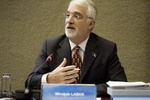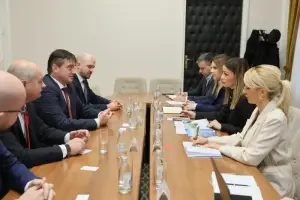Q:
A:
State resolved to fight crime
Belgrade,
17 November 2005
Serbian Deputy Prime Minister Miroljub Labus said today that the problem of financial crime has still not been resolved in Serbia, but that the progress has surely been made and that the state is committed to fight against all forms of crime with all means necessary.
Opening a two-day international conference entitled "Possibilities of confiscating property acquired through financial crime" which is being held in the Sava Centre, Labus said that the directorate for prevention of money laundering in Serbia discovered only 120 suspicious cases out of 300,000 checked financial transactions and reported that to the competent bodies - the police, customs and inspection services.
On the basis of investigation results, the competent bodies filed 17 criminal complaints, and 11 requests for conducting an investigation. However, criminal proceedings were instigated in only seven cases, but no proceedings have been completed.
Labus said that the directorate for the fight against organised crime and the directorate for prevention of money laundering deserve greater political, financial and personnel support, and added that better connection of tax and customs services is also necessary.
Labus said that the work of the customs office has been largely improved and that, as opposed to five years ago, it is no longer mentioned as a source of financial crime.
The Deputy Prime Minister said that it is necessary to continue the improvement of the work of courts and reiterated that without courts and good investigation it is not possible to discover criminal acts and confiscate illegally acquired financial gain. Labus said that the lower the level of financial crime is, the greater the chance for foreign investment and economic growth.
UN Assistant Secretary General Kalman Mizsei pointed out that although the legal frameworks in the countries of the western Balkans have improved remarkably in the past years, a lot more needs to be done.
Mizsei explained that the problem is that the countries with weak legal frameworks and sources and structures for law enforcement have become magnets for international financial crime.
The UN Assistant Secretary General said that according to the estimation of the OECD, money laundering presents the third largest industry in the world, and annually at the global level, sums ranging between $500 billion to $1 trillion are “laundered”.
Serbian Supreme Court President Vida Petrovic-Skero said that work is being done on the strategy for fight against corruption and crime in general and agreed that there are weaknesses in the judiciary which play a very important role, but warned that for quality work it is necessary to create conditions where laws pertaining to that area can be effectively implemented.
Petrovic-Skero said that precisely in what manner confiscation of property acquired through crime will be carried out will depend on the surrounding conditions. That what presents the judiciary with a problem is the method of establishing which fixed assets have been obtained by crime. She added that it is not enough only to have laws, but also the mechanisms for implementing them.
The conference was attended by more than 150 judges, prosecutors, and representatives of governments from the entire region, as well as officials from France, the US Treasury Department and representatives of teams for combating financial crime from several European states.
On the basis of investigation results, the competent bodies filed 17 criminal complaints, and 11 requests for conducting an investigation. However, criminal proceedings were instigated in only seven cases, but no proceedings have been completed.
Labus said that the directorate for the fight against organised crime and the directorate for prevention of money laundering deserve greater political, financial and personnel support, and added that better connection of tax and customs services is also necessary.
Labus said that the work of the customs office has been largely improved and that, as opposed to five years ago, it is no longer mentioned as a source of financial crime.
The Deputy Prime Minister said that it is necessary to continue the improvement of the work of courts and reiterated that without courts and good investigation it is not possible to discover criminal acts and confiscate illegally acquired financial gain. Labus said that the lower the level of financial crime is, the greater the chance for foreign investment and economic growth.
UN Assistant Secretary General Kalman Mizsei pointed out that although the legal frameworks in the countries of the western Balkans have improved remarkably in the past years, a lot more needs to be done.
Mizsei explained that the problem is that the countries with weak legal frameworks and sources and structures for law enforcement have become magnets for international financial crime.
The UN Assistant Secretary General said that according to the estimation of the OECD, money laundering presents the third largest industry in the world, and annually at the global level, sums ranging between $500 billion to $1 trillion are “laundered”.
Serbian Supreme Court President Vida Petrovic-Skero said that work is being done on the strategy for fight against corruption and crime in general and agreed that there are weaknesses in the judiciary which play a very important role, but warned that for quality work it is necessary to create conditions where laws pertaining to that area can be effectively implemented.
Petrovic-Skero said that precisely in what manner confiscation of property acquired through crime will be carried out will depend on the surrounding conditions. That what presents the judiciary with a problem is the method of establishing which fixed assets have been obtained by crime. She added that it is not enough only to have laws, but also the mechanisms for implementing them.
The conference was attended by more than 150 judges, prosecutors, and representatives of governments from the entire region, as well as officials from France, the US Treasury Department and representatives of teams for combating financial crime from several European states.












